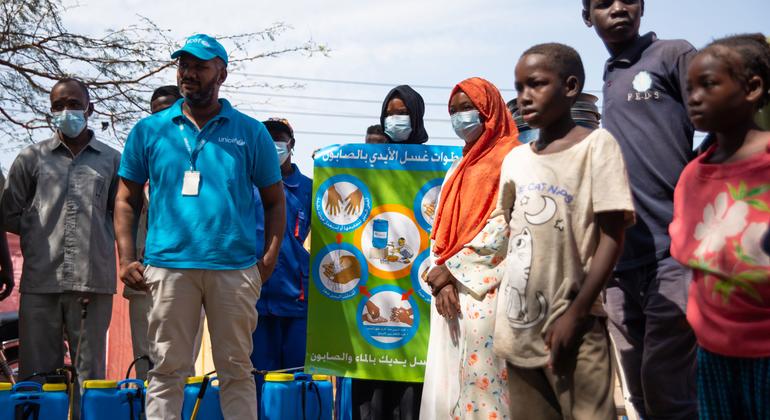UN agencies and partners are scaling up response to the outbreak, which was first declared in Gedaref state, located in the east, on 26 September.
At least 2,525 suspected cases of acute watery diarrhoea/cholera have been reported, including 78 associated deaths, in 27 localities across seven states.
Millions at risk
More than 3.1 million people are estimated to be at risk through the end of the year, according to the latest OCHA update.
Humanitarian agencies are supporting the detection and treatment of cases, while surveillance is ongoing in affected and high-risk areas to identify and address risk factors.
Last week, the sixth flight chartered by UN health agency, WHO, landed in Port Sudan, located on the Red Sea coast, from its Global Logistics Hub in Dubai.
The plane delivered more than 33 metric tonnes of supplies for cholera response, including medicines, laboratory supplies and equipment, as well as reproductive health kits for the UN Population Fund (UNFPA).
Vaccines on the way
Furthermore, the international mechanism that manages and coordinates emergency vaccine supply has approved the authorities’ request for nearly three million doses of oral cholera vaccines that will be used in campaigns in nine localities in Gedaref and two other states.
They are expected to arrive on 20 November and the vaccination campaigns should begin by the end of the month.
Conflict still raging
The cholera outbreak is taking place against the background of conflict that erupted in mid-April between the Sudanese army and a rival paramilitary group known as the Rapid Support Forces (RSF).
More than six million people have fled their homes, with 1.2 million escaping across the border.
The UN refugee agency, UNHCR, recently warned that reports of continued sexual violence, torture, killings, and other violations in West Darfur echo atrocities committed 20 years ago.
Healthcare under pressure
The conflict is “straining the health system to its limits”, WHO Director-General Tedros Adhanom Ghebreyesus said on Monday, posting on social media platform X.
“As violence escalates in Darfur, numerous individuals are fleeing to Chad in search of safety, further burdening an already fragile nation,” he wrote.
Although WHO “is actively coordinating with partners to establish mobile clinics, enhance surveillance, and distribute essential medicines and supplies,” Tedros said efforts are being hampered by “the challenging security situation, as well as bureaucratic and administrative obstacles that impede access.”
He appealed to the international community to focus attention on Sudan and the pressing needs there.



